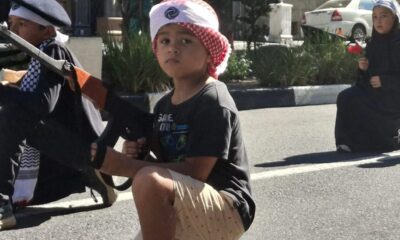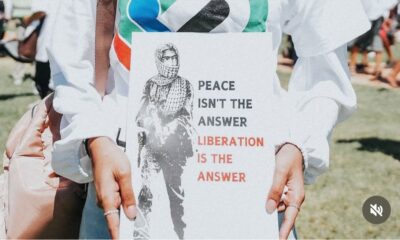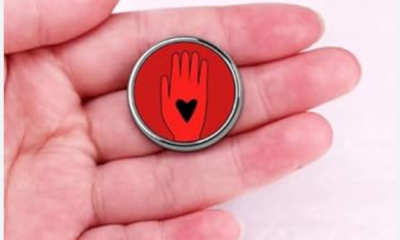
Israel

SA musician’s Justice gives anti-Israel hypocrisy the rap
In a recently released single titled Justice, musician Joey Avinir (26) holds nothing back, expressing frustration at Israel being blamed, shamed, and silenced in its defence against terror and war crimes.
Avinir, a South African born and bred, Israel Defense Forces soldier, and Nova festival survivor, talks through his musical compilation about the fact that he shares this pain of betrayal with the nation of Jewish people. He sings of them having witnessed the truth being masked by mass media and carefully withheld from the rest of the world.
“My goal is for those who hear it and relate to it, to share it,” Avinir told the SA Jewish Report this week. “I didn’t record it to claim accolades; I want it to go viral for the sole purpose of spreading Israel’s truth to as many people as possible.”
Justice is an anthem for a heartbroken nation that highlights the powerful force of extremist propaganda. It’s also a desperate plea for truth in a world shrouded by escalating antisemitism, and it’s hitting a chord among many Jews worldwide.
Avinir’s strong message is punctuated by anger, not least because he believes the nation’s year-long plea for the right to exist has simply been ignored.
His personal experience of 7 October permeates every chord he plays. Fierce, fast-rhyming lyrics are hard-hitting, but the rage they hold is tenderly embraced by a deeply moving and melodic piano.
Avinir references Hitler’s Nazi party’s chief propogandist, Joseph Goebbels, who said, “If you tell a lie big enough and keep repeating it, people will eventually come to believe it.”
“This is the reason I wrote the song,” he says.
In the song, Avinir belts out a slew of examples of misinformation in mainstream media, “Hospital bombing you blamed it all, families were taken you praised it all, October the seventh, you tamed it all, shooting up lines to erase us all.”
His truth-laden lyrics are interlaced by a gentle and catchy chorus, “They say it’s gonna be alright, I know the world’s full of lies, they think they’re on justice side…”
Avinir’s experience was a catalyst to writing the song, “A few hours after escaping the Nova festival, I arrived home only to receive an emergency call to be dispatched to the northern border as a reservist to defend Israel from further attack,” he says.
“Through a frantic flurry of events that spanned hours, days, and weeks, I had no time to ingest my reality, to process any of it, or talk about what I was experiencing. I just jumped from one traumatic experience to the next – from escaping Nova, to heading up north to high alert reports of more attacks, to loud ongoing threats of rocket fire every day for more than a month.”
Eventually symptoms of post-traumatic stress disorder began to take hold and hinder Avinir’s focus on the force. With encouragement from his commanding officer and the support of his unit, he made the difficult decision to go home to recover. It was during this time that Avinir wrote Justice.
Seated alone in his studio behind his keyboard, Avinir was flooded by emotions that until that moment he had been unable to express.
“I had no plans or intention of writing a song,” he says, “I just started playing two chords over and over again, and the floodgates opened. I screamed out all my frustration, everything that was in my head, everything I felt and experienced came rolling out over two chords I played repeatedly.
“I guess it was a therapeutic outburst that turned into a song,” Avinir says.
“It’s funny that in the genre of black rap culture where expressions of generational trauma and emotional and social hardships are told, here I am, this white, privileged Jewish South African Israeli, expressing [myself] in the very same way. But it’s raw, true, authentic, and honest. It opened me up to the powerful healing capacity of this genre.”
Without the pressure of a complex music compilation, the song took shape within a few days. Justice now exists as an undeniable expression of the thoughts and feelings of a nation.
Says Avinir, “When I was confronted by mass media wrongfully translating the reality that I had experienced first-hand, I had no words for the anger and frustration I felt until I found them.”
Avinir’s lyrics in Justice appeal to ears who want to hear the truth: “They’re not freedom fighters, they’re liars, I’ve seen with my eyes.” The rhymes are intricate and expressive, “I’m calling out all of the feminists, who stand on the side all anonymous. I’m calling out all of the activists who turned themselves over to populists. All the numbers you see in the papers, are my sisters and brothers, my neighbours. Fighting at war, trying to hold up the fort and your cameras are rolling, this can’t be ignored.”
The song was released in the same week news headlines whispered of the “death of six Israeli hostages”, with no inclination to describe the blood-soaked hands of the Hamas terrorists who perpetrated violent assassinations of the innocents one by one.
Says Avinir, “‘All eyes on Rafah’ flooded Facebook, Instagram, and other social media platforms, but the silence was deafening when the world suddenly turned a blind eye to Rafah. Just another greatly guarded mistruth.
“So far, there has been a grateful response to the song from many Jews around the world. Israelis are thanking me for expressing it in English, saying it brings a closer connection and greater transparency from a Hebrew to English-speaking world. Many say it’s a direct translation of how they feel.”
The music video for Justice will be officially released on 7 October. It’s a clean, meaningful, and understated production dedicated to the memory of Nitai Matodi (23), a close friend of Avinir’s and a soldier who was murdered defending Israel during the week the song was released. Matodi was the son of Lara Matodi, also from a South African family of olim.
Spotify:
https://open.spotify.com/track/1Mpq4JH9oYsYdakoQMoRTB?si=wtGmRwTfSeac8XUOzGRTgw










